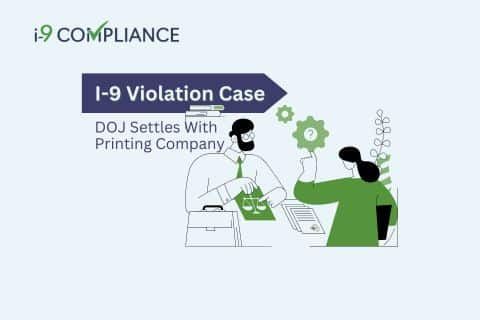DOJ Settles I-9 Violation Case With Printing Company

The Department of Justice (DOJ) has announced that it has reached a settlement agreement with a North Carolina-based printing and fulfillment company. This settlement addresses allegations that the company violated the Immigration and Nationality Act (INA). These allegations included how the company discriminated against a worker based on citizenship status during the employment eligibility verification (Form I-9) process.
The Assistant Attorney General of the Justice Department’s Civil Rights Division emphasized the importance of adhering to the INA. According to the Assistant Attorney, Kristen Clarke, “Companies cannot reject workers’ valid documents or require specific or unnecessary documents based on citizenship status when checking their permission to work. The Justice Department will continue to hold accountable employers who run afoul of our nation’s civil rights laws.”
During its investigations, the DOJ found that the printing company had required a worker to present a permanent resident card. The company allegedly refused her Social Security Card and driver’s license, which are acceptable documents for proving the right to work.
The Civil Rights Division’s Immigrant and Employee Rights Section (IER) also discovered that the company discriminated against non-U.S. citizens for at least a year. This discrimination required them to present specific documents to prove their right to work. However, they allowed U.S. citizens to choose the documents they used to prove their right to work.
This practice is not legal. Federal law requires employers to allow all employees to choose which documents they want to prove their employment eligibility. The only requirement is to ensure the validity of the documents. As such, employers cannot request extra documents and cannot specify which documents employees may use.
As a result of the settlement, the company must pay a $27,500 civil penalty. They must also pay $6,200 in back pay and wages to the employee they discriminated against. The DOJ also required the company to provide relevant training to its Human Resources personnel. Finally, the company must provide employees with a link to the Civil Rights Division’s Immigrant and Employee’s Rights Poster.
As this case clearly illustrates, ensuring compliance with employment eligibility verification requirements has proven challenging for employers. Employers can ensure they avoid mistakes and remain compliant with Form I-9 by incorporating an electronic I-9 management system. This system offers HR personnel step-by-step guidance, digital storage, and reminders of when to take action. It also provides the option for E-Verify integration for employers using E-Verify.
Learn more about automating your employment eligibility verification and ensuring compliance with I-9Compliance.